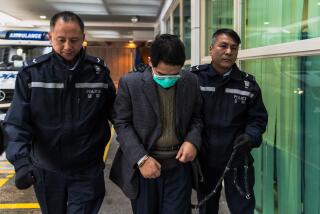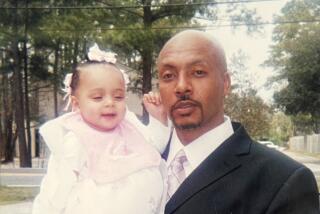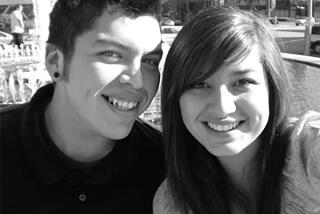He looked to his uncle for guidance. Then his uncle went on a deadly rampage
The last time Sahib Taylor saw his uncle, Gavin Eugene Long, he was wearing a bulletproof vest.
That was about four months ago, at a family gathering. Long said he was wearing the vest as a precaution in a time of racially charged unrest over police shootings in cities across the United States, Taylor recalled.
“We have to be prepared to protect ourselves and our family,” Long told relatives.
Then, on Sunday, Long shot and killed three Baton Rouge law enforcement officers and wounded three others, shocking a nation already reeling from a similar deadly attack in Dallas just over a week before and leaving his family to reconcile the man they knew with the attack that added to the growing sense that authorities are under siege.
“Gavin was a mentor, a father figure to me,” Taylor, 22, said. “I don’t understand exactly what moved him to do this.”
But there were distressing signs that Long had been slowly cutting himself off from a diverse, bureaucratic society he grew to disdain.
Taylor didn’t know his father when he was growing up in south Kansas City’s working-class neighborhoods of aging brick and wood-framed homes, auto repair shops, beauty parlors and taverns.
Taylor was a sophomore at University Academy in Kansas City when his mother, Kim Long, introduced him to her brother, Gavin. Taylor started seeking Gavin Long’s counsel, expecting wise words from the lean ex-Marine Corps sergeant with the countenance of a Zen master.
Taylor was impressed that his uncle had self-published three books and had traveled to African nations including Ethiopia and Egypt. He was struck by the way Long had immersed himself in African culture and history and the African American struggle for civil rights.
They would take walks in local parks and long drives in Long’s compact gray Honda, and talk for hours about the purpose of life.
His uncle stressed the importance of self-reliance and shared his ideas about racism, and about how only advanced survival skills and decisive action could thwart the government that allowed it to persist.
“He told me to be assertive, self-disciplined and to protect and defend myself and my family from people who would want to hurt us,” Taylor recalled. “He was passionate about living alone.”
NEWSLETTER: Get the day’s top headlines from Times Editor Davan Maharaj >>
“He’d say, ‘What defines you as a man? The things you do alone. Who am I at my best? A man who depends on no one else for anything.’”
Long considered himself an apostle of masculine independence, defiance and liberty. On social media and in podcasts produced in a Kansas City studio, he’d talk about the importance of being an alpha male and how weak, effeminate role models are corrupting society.
Initially, Taylor, the shy teenager who could not find his calling, could not have been more proud of his uncle.
But some of Long’s notions carried ominous overtones. Primed with reading material by black separatists and a growing suspicion toward government and law enforcement agencies, Long became increasingly preoccupied with the idea that black people were under assault and must take steps to defend themselves.
Taylor’s uncle told him that powerful forces were conspiring to shape their lives. He warned that “international corporations, federal banks and political organizations use their power in special ways to control, corrupt and exploit ethnic groups,” Taylor said. “He said that news media and social media hide the truth, and that the government uses police to control and even kill people.”
Over time, Long’s inconsistencies and personal failings began to catch up with him. He was “a complete loner,” Taylor said. “And his view of life was limited to issues that affected African Americans. I started to wonder: What about Hispanics, Asians and everyone else?”
Now, his nephew is left struggling to process why the man he admired growing up went on a deadly rampage.
“I believe that Gavin was tired of it all,” he said, “the police killings, the bloodshed, the innocent people getting shot and killed and hurt because they are helpless to do anything to stop it.”
“I believe that Gavin was trying to show people that we have to stand up to injustice,” he said.
Law enforcement authorities say Long was dressed in black and armed with two rifles and a 9-millimeter handgun as he ambushed officers at the B-Quik gas station on Airline Highway, less than a mile from the city’s police headquarters.
Long “completely dismissed” civilians who were walking through the area, instead stalking police officers and positioning himself to shoot at close range, Col. Michael D. Edmonson, superintendent of the Louisiana State Police, said at a news briefing two days after the shooting.
Within minutes of beginning his rampage, Long had left a scene of carnage.
“There is no doubt whatsoever that these officers were intentionally targeted and assassinated,” Edmonson said. “It was a calculated act against those who work to protect this community every single day.”
“I want to understand why Gavin did this,” Taylor said, “but I’m not there yet.”
Taylor’s mother last saw her brother about two weeks ago.
“She told me that Gavin kept posing and smiling at himself in front of a living room mirror,” he said. “She said it was as though he was taking a proud look at himself because he knew he wasn’t going to be around much longer.”
ALSO
Amid death and racial tension, Baton Rouge mayor struggles to hold city together
For some residents, racial tensions invoke reminders of a segregation-era Baton Rouge
More to Read
Start your day right
Sign up for Essential California for news, features and recommendations from the L.A. Times and beyond in your inbox six days a week.
You may occasionally receive promotional content from the Los Angeles Times.







